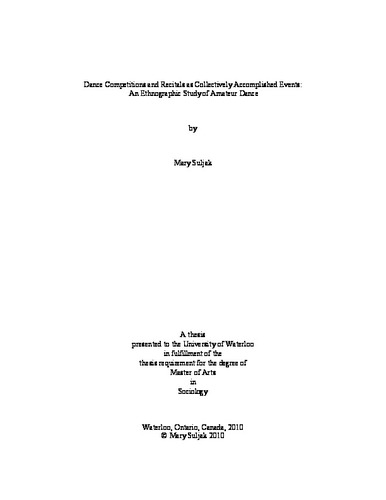UWSpace will be migrating to a new version of its software from July 29th to August 1st. UWSpace will be offline for all UW community members during this time.
Dance Competitions and Recitals as Collectively Accomplished Events: An Ethnographic Study of Amateur Dance
| dc.contributor.author | Suljak, Mary | |
| dc.date.accessioned | 2010-01-22 18:50:41 (GMT) | |
| dc.date.available | 2010-01-22 18:50:41 (GMT) | |
| dc.date.issued | 2010-01-22T18:50:41Z | |
| dc.date.submitted | 2010 | |
| dc.identifier.uri | http://hdl.handle.net/10012/4979 | |
| dc.description.abstract | This thesis presents a qualitative analysis of organized amateur dance participation as an example of human group life. Organized amateur dance typically occurs within a studio or school setting and is differentiated from professional dance by the lack of monetary compensation provided to performers. Consequently, this thesis considers the dance studio as an arena for pursuing hobby-based interests and activities, as well as notions of providing entertainment as entertainment in and of itself. Using a symbolic interactionist theoretical perspective in conjunction with ethnographic methodology, this thesis analyzes the centrality of performance among amateur dance participants, related to group-based definitions of competitions and recitals as the most significant aspects of their dance involvements. By envisioning competitions and recitals as instances of coordinated activity, this thesis employs Prus’ (1997: 135) conceptual model for participating in collective events as a means of highlighting the processual quality characteristic of developing performance events. Further, this thesis uses Goffman’s (1959) conceptualization of team-based dynamics as a means of illustrating how meanings about the group, the activity at hand and the event being anticipated are created, negotiated and perpetuated in a group-based setting. Data obtained from the observation of dance groups as they prepared for and engaged in competitions and recitals as well as open-ended interviews with twenty members of the amateur dance community is used to illustrate the various stages of accomplishing performance events. This analysis begins with participant experiences in initiating events and becoming involved with them, followed by a discussion on how these groups prepare for, sustain and participate in performance events. While this thesis focuses predominantly on amateur dance involvements, it also provides a transcontextual analysis of the interactionist concept of the collective event, through comparisons with research conducted on groups based on activities other than dance. Through field data and these various comparisons, this thesis finds that working toward and participating in group-based ventures encourages the development of a team- based awareness and sense of purpose among the participants of a wide variety of activities. Because having a central focus and common awareness with regard to an activity is integral to the sustained commitments and involvements of participants, this thesis finds the interactionist notion of collective events to be a central feature of human lived experience. | en |
| dc.language.iso | en | en |
| dc.publisher | University of Waterloo | en |
| dc.subject | dance | en |
| dc.subject | symbolic interactionism | en |
| dc.title | Dance Competitions and Recitals as Collectively Accomplished Events: An Ethnographic Study of Amateur Dance | en |
| dc.type | Master Thesis | en |
| dc.pending | false | en |
| dc.subject.program | Sociology | en |
| uws-etd.degree.department | Sociology | en |
| uws-etd.degree | Master of Arts | en |
| uws.typeOfResource | Text | en |
| uws.peerReviewStatus | Unreviewed | en |
| uws.scholarLevel | Graduate | en |

